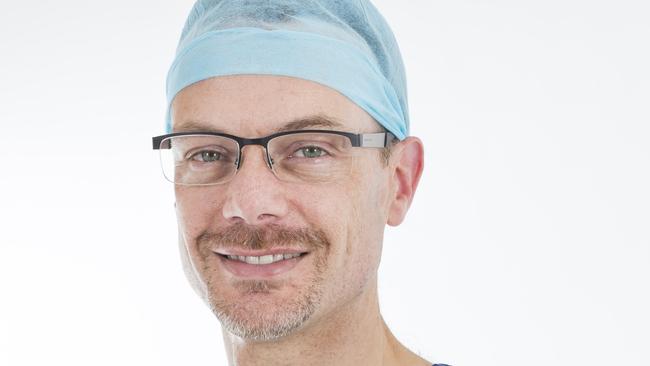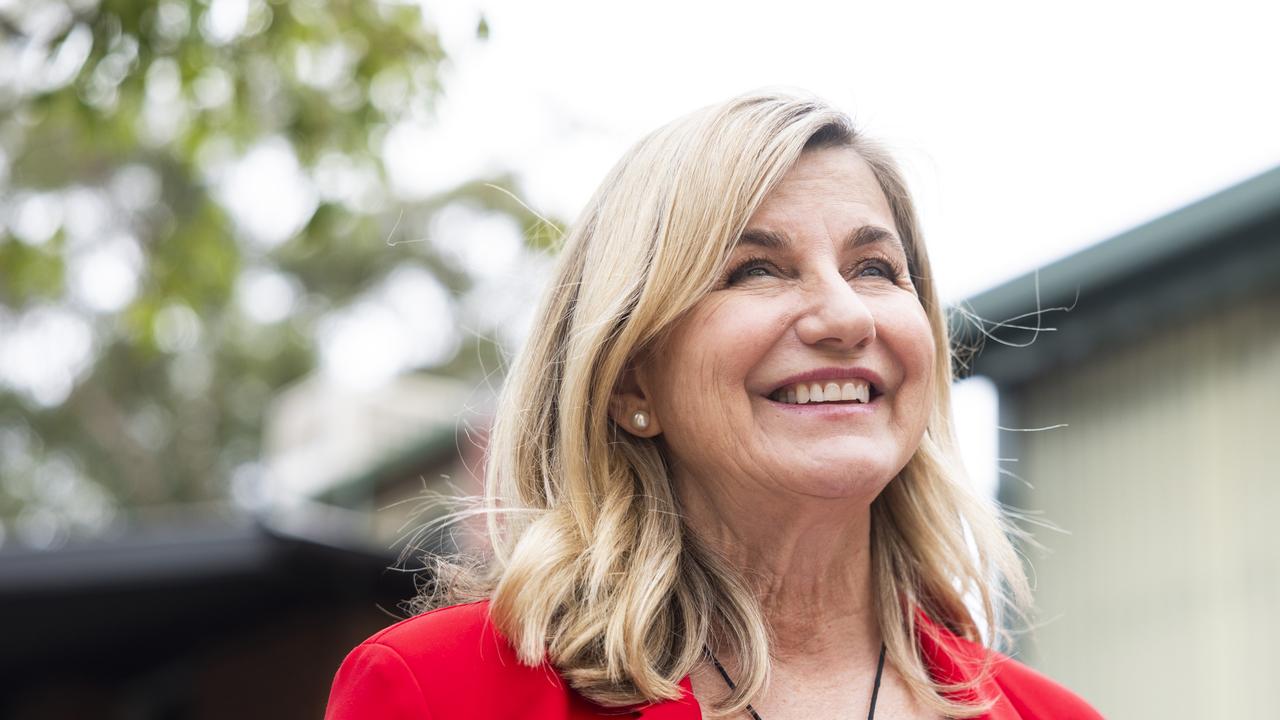Sydney RPA heart-lung surgeon Michael Byrom under official restriction
Medical regulators restrict Michael Byrom from performing major heart, lung surgery following a three-year saga.

Medical regulators have restricted cardiothoracic surgeon Michael Byrom from performing major heart and lung surgery following a three-year saga that continues to rock one of Sydney’s most prestigious teaching hospitals.
The extensive conditions on Dr Byrom’s practice, which he says were imposed with his consent, restrict him to inserting pacemakers and defibrillators and outline a stringent program of supervision and retraining. It follows a performance assessment commissioned by the Medical Council of NSW, prompted by complaints by fellow surgeons.
“The council considered the independent assessment recommendations and, in order to protect the public, conditions were imposed on Dr Byrom’s registration,” the council said in a letter.
The conditions have now been published under Dr Byrom’s listing on a public register maintained by the Australian Health Practitioners Regulation Agency.
The conclusion of the Medical Council’s performance assessment follows a series of articles published in The Australian that detailed the serious concerns held by Dr Byrom’s former colleagues over surgical outcomes. The doctors also alleged clinical governance failings by administrators at the Royal Prince Alfred Hospital in their handling of the issues.
Three surgeons reported concerns a year ago about the manner in which eight of Dr Byrom’s patients died, during or following heart surgery.
Dr Byrom insists the complaints into preventable patient deaths were unfounded, citing the council’s performance assessment report, which said “despite the relentless complaints that have been made against (the surgeon), the assessors do not consider that at any time his practice represented a risk to the health or safety of the people of NSW”.
The Weekend Australian is not suggesting Dr Byrom’s level of care was substandard, nor that he contributed to any patient deaths.
“I am pleased with the conclusions in the council report,” the surgeon said. “Once again, my surgical results have been found to be consistent with my surgical peers. In stark contrast to the allegations made about me, the report found no evidence of a risk to the safety of my patients.”
The conditions placed on Dr Byrom’s practice are onerous. The Medical Council requires him to undergo retraining, and it has prevented him from supervising other doctors and medical students. He must work under the guidance of a mentor with regular reviews into his practice, and a particular focus on patient selection, technical skills, clinical judgment, intra-operative decision-making and communication with peers and colleagues.
NSW Health said in a statement that the Sydney Local Health District, which manages RPA, would continue to support Dr Byrom through his retraining.
“The outcome of the (Medical Council) performance assessment is that practice conditions have been imposed on Dr Michael Byrom, with his consent,” a NSW Health spokesperson said.
“The Medical Council’s performance pathway is a non-disciplinary program. The conditions imposed on Dr Byrom were to address the need for him to undertake a reskilling/retraining program due to his lack of recency of practice.”
Previous investigations found that his practice did not meet standards. Dr Byrom rejects complaints about his practice and insists the Medical Council rejected those investigation findings.
Dr Byrom said: “As a consequence of the complaints, in July 2019, I voluntarily chose to cease undertaking major cardiothoracic procedures until these matters could be definitively resolved,” Dr Byrom said. “The result of the cessation of practice while awaiting the outcome of the complaints has meant that I have now not undertaken independent major cardiothoracic procedures for some time.
“The Medical Council of NSW believes, and I agree, that a period of supervised reskilling is necessary to return to full cardiothoracic surgical practice, following the Royal Australian College of Surgeons pathway for any practitioner who has been out of major surgical practice for this length of time.”
In June last year, three surgeons filed a mandatory report with the NSW Health Care Complaints Commission, detailing “serious concerns over Dr Byrom’s performance providing an ongoing threat to patient safety”. The surgeons escalated their concerns to regulators after unsuccessfully attempting to raise issues with Dr Byrom’s practice within RPA.
One of the surgeons expressed relief that conditions had been imposed. “It’s profoundly disappointing that it’s taken this long,” the surgeon said. “Throughout the whole process, we’ve been completely vilified by the institution for standing up for patient safety.”
The saga involving Dr Byrom began in mid-2016, when four patient deaths prompted an initial program of supervision and retraining.
In November 2016, an investigation report was ordered following adverse surgical outcomes. The report by two independent interstate surgeons, Julian Smith and Michael Gardner, found Dr Byrom “did not meet the standard reasonably expected of a cardiothoracic surgeon of an equivalent level of training or experience”.
Dr Byrom returned to clinical practice in 2017 following a period of retraining. But shortly afterwards further issues arose with his surgery and Professor Smith and Dr Gardner were asked to undertake a second investigation, which again found he did not meet required standards.
The report said further remediation of the surgeon’s performance was not recommended. Dr Byrom says the Medical Council has found the two reports by Professor Smith and Dr Gardner to be “flawed and erroneous”.
In September 2018, despite the second Smith-Gardner report finding, the Sydney Local Health District’s chief executive, Teresa Anderson, who was intimately involved in the management of the issues, cleared the surgeon to return to unsupervised practice.
The decision overruled that of RPA’s head of cardiothoracic surgery, Paul Bannon, who had shortly earlier announced Dr Byrom was suspended with no prospect of further rehabilitation.
Another patient death occurred within weeks, in November 2018, that is now being probed by the NSW coroner. In that case, it is alleged an infection that developed in a patient, 72-year-old Dimitrios Kyriazopoulos, following chest surgery was allowed to fester for two weeks until he developed sepsis and died of an airway haemorrhage and hypoxic brain injury. Mr Kyriazopoulos’s family is calling for a full review of clinical governance at the RPA.
“We remain hopeful that all issues are thoroughly investigated,” said son Kris Kyriazopoulos. “We simply want accountability, clear understanding on the whole event, with a full review that will help implement revised processes and procedures.”
Following the Kyriazopoulos death, early last year Dr Anderson commissioned two local surgeons to undertake a fresh investigation into Dr Byrom’s practice. The resulting report found his practice was safe. A memorandum from Dr Anderson published in February last year said: “The supervision reports provided to the panel did not raise any issues of concern and it is the panel’s view that Dr Byrom is fit to perform his role as a cardiothoracic surgeon without restrictions.”
“Teresa Anderson ignored senior clinicians,” one of the complainant surgeons said. “She went contrary to their concerns. She ignored external expert options that were definitive.”
The actions of regulators have also come under scrutiny because of the Byrom affair. Initially, when a mandatory report was made to the HCCC following the November 2018 death, it was referred back to the Sydney Local Health District — the very administrator accused of failing to protect patient safety.
When a second complaint was made — this time detailing eight allegedly preventable deaths and claims of multiple near-misses — the HCCC declined to investigate, relegating the complaints to a lesser assessment process.
“Following the review of all of the extensive material gathered as part of the assessment, and in consultation with the Medical Council of NSW, it was determined that the complaint did not meet the threshold for formal investigation and the most appropriate course of action was referral to the council for its management,” the commission said at the time.
Dr Byrom is now required to report the conditions placed on his registration to any future employer. He remains a visiting medical officer at RPA.
“The district will ensure that Dr Byrom works in accordance with the applicable conditions at all times,” a spokesperson for NSW Health said.



